Best On-premises IP-PBX Phone Systems if you Own IP Phones
 These five on-premise IP-PBX phone systems are outstanding
SMB business solutions that offer multi-channel Unified Communications.
Each can be deployed with almost any SIP compliant phone, which designates
these five IP-PBXs as leading
choices for companies looking to switch back to an on-premise PBX to lower
costs.
These five on-premise IP-PBX phone systems are outstanding
SMB business solutions that offer multi-channel Unified Communications.
Each can be deployed with almost any SIP compliant phone, which designates
these five IP-PBXs as leading
choices for companies looking to switch back to an on-premise PBX to lower
costs.
You can set up a PBX business phone system using the phones you already have.
A traditional PBX can connect all your IP desk phones if it's the right one. And that's very important. Some PBXs only work with proprietary phones. Here are five easily found PBXs that work with the majority of SIP phones.
Already own IP phones? Then these on-premise phone systems are the leading choices. Each accepts numerous phone manufacturers, such as, Polycom, Digium, Snom, Yealink, Grandstream, etc.
The most significant expense of a phone system deployment frequently lies with the purchase of phones. Companies that own their own phones routinely discover that installing a new on-premise PBX is a remarkably reasonable proposition to lower monthly costs. Unlike contact centers, many companies find not every employee is a heavy phone user. Employees that engage in billing and accounting, for instance, are not constantly on the phone. Not having to pay a monthly fee for every extension results in considerably lower ongoing expenses. In addition, expanding the number of extensions with any of the following on-premise IP-PBXs won't require an increased monthly expense.
Five Business Phone Systems to use with Your Existing IP Phones
 Yeastar
offers two award-winning IP-PBXs, the S-series and the P-series.
Yeastar
offers two award-winning IP-PBXs, the S-series and the P-series.
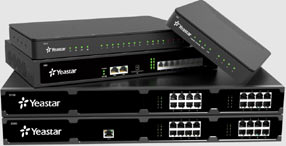 The S-series VoIP PBX is ready right out of the box to find your phones and
start the registration process. And you'll find they provide the capabilities to connect to any
type of PSTN provider, including PRI. It's an affordable small business
phone system without any extra license fees and incorporates most must-have phone
PBX features plus
call recording.
The S-series VoIP PBX is ready right out of the box to find your phones and
start the registration process. And you'll find they provide the capabilities to connect to any
type of PSTN provider, including PRI. It's an affordable small business
phone system without any extra license fees and incorporates most must-have phone
PBX features plus
call recording.
The P-series expands to advanced multi-channel communication with
visualized call management, video communications, advanced call center
features, and unified communications applications. You can connect
anywhere, anytime, across browsers, mobile phones, and desktops.
Pros
- Yeastar offers award-winning, easily managed, affordable UC systems.
- Multi-language support with 350,000 customers in over 100 countries.
Best For:
- Hospitality, call center, solution, retail, transportation.

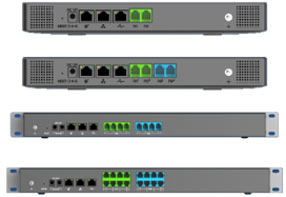
Grandstream's UCM series of IP-PBXs are impressive yet easy to manage. Each delivers a platform for voice, video, data, and mobility communications with an extensive set of UC features. These affordable servers come without licensing fees, upgrade fees or costs per feature. Integrated UC features include voice, instant messaging (IM), voice meetings, audio web meetings, data, analytics, mobility, facility access, and intercom.
Pros
- Feature rich VoIP ready IP-PBX without license fees.
- You can easily add cameras and facility door access for security.
Best For:
- Self management. Excellent choice for non-profit, offices, mixed manufacturing facilities, retail and restaurants.
 PBXact,
based on the open-source FreePBX IP-PBX, remains a fully featured
hardened UC platform.
PBXact,
based on the open-source FreePBX IP-PBX, remains a fully featured
hardened UC platform.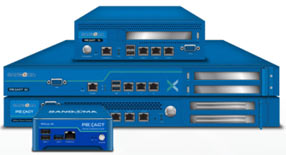 It incorporates tools and apps for easy remote
worker integration, as well as, advanced call queues, IVR, reports,
and integration with CRM apps.
It incorporates tools and apps for easy remote
worker integration, as well as, advanced call queues, IVR, reports,
and integration with CRM apps.
The integrated online portal
store allows businesses to instantly deploy extra apps, like Sangoma Property Manager, tailored for the hospitality industry. Or
the PBXact Call Center, a readymade solution for in-bound call
centers. Education frequently requires the Employee Alerts Packaged App,
which provides system administrators a tool to send alerts via email
and SMS text messaging to all employees or designated groups.
Pros
- It's straightforward and instantaneous to deploy additional ready-to-go business apps.
- The system incorporates seamless built-in communications tools for voice, video, chat, and collaboration on any device.
Best For:
- Hospitality, education, contact centers, non-profit, finance, healthcare.
 Switchvox,
which was
originally developed by Digium, the creator of Asterisk, is currently owned by Sangoma.
Switchvox,
which was
originally developed by Digium, the creator of Asterisk, is currently owned by Sangoma.
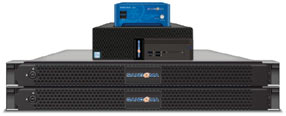 They
have continued to enhance these premise-based IP-PBXs into some of the
most robust systems available and recently received a Unified
Communications Product of the Year award. With Asterisk at its core, it's easy
to deploy with any SIP compliant phone. However, when coupled with Sangoma
D-Series phones and softphones, instantly turns into a comprehensive Unified Communications
solution that combines advanced features, such as conference bridge, a
chat/instant messaging server, video calling, advanced call queues, and
Interactive Voice Response. Using the Switchboard web interface, users can
access timesaving features like click-to-call, call history, and real
time call stats. And collaborate using screen share and group chat, which
is built into the desktop softphone.
They
have continued to enhance these premise-based IP-PBXs into some of the
most robust systems available and recently received a Unified
Communications Product of the Year award. With Asterisk at its core, it's easy
to deploy with any SIP compliant phone. However, when coupled with Sangoma
D-Series phones and softphones, instantly turns into a comprehensive Unified Communications
solution that combines advanced features, such as conference bridge, a
chat/instant messaging server, video calling, advanced call queues, and
Interactive Voice Response. Using the Switchboard web interface, users can
access timesaving features like click-to-call, call history, and real
time call stats. And collaborate using screen share and group chat, which
is built into the desktop softphone.
Pros
- Totally scalable and flexible Unified Communications platform that integrates with IP phones, SIP trunks, and any PSTN connection.
- Efficient integration of chat, video chat, quick dial, status, presence, and call rules.
Best For:
- Education, contact centers, government, healthcare and auto-dealerships.
 FreePBX
appliances by Sangoma are the only PBX built purposely for open-source
FreePBX.
FreePBX
appliances by Sangoma are the only PBX built purposely for open-source
FreePBX.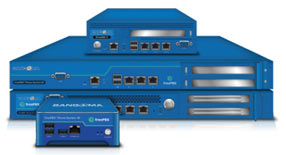 Designed and rigorously tested for optimal performance, these
appliances come preloaded with the FreePBX Distro and include a
one-year warranty. Incorporating Asterisk as its core PBX software,
these servers can be used with just about any SIP compliant phone.
Designed and rigorously tested for optimal performance, these
appliances come preloaded with the FreePBX Distro and include a
one-year warranty. Incorporating Asterisk as its core PBX software,
these servers can be used with just about any SIP compliant phone.
Sangoma provides, for a fee, a number of enhanced features apps, like Endpoint Manager, which makes provisioning phones easy and advanced call center tools, as examples.
Pros
- FreePBX appliances offer maximum control for custom deployments.
- An extremely affordable choice that can be deployed with nearly any IP phone.
Best For:
- A scalable custom platform as business needs grow.
Ultimately, deciding which PBX system is right for your business depends on budget and your business needs, now and in the future.
A recommended option is to respond to a few straightforward questions. Then, with no obligation compare quotes from telecom professionals who understand business communications.
Conclusion- Moving from Hosted VoIP to an on-premises IP-PBX often Lowers Costs Significantly
If you own you own IP phones, ensure that they are unlocked and can be configured to re-provision to the new phone system.
 All five of these on-prem IP-PBX solutions can be deployed using
just about any of
the leading manufacturers of IP phones. Furthermore, each server can
utilize SIP trunking for lower cost calling while maintaining the sophisticated business features that
employees have come to
appreciate.
All five of these on-prem IP-PBX solutions can be deployed using
just about any of
the leading manufacturers of IP phones. Furthermore, each server can
utilize SIP trunking for lower cost calling while maintaining the sophisticated business features that
employees have come to
appreciate.
If you don't have existing phones, then using the same IP-PBX manufacturer remains the superior choice.
Additionally, each of these systems can connect to the PSTN using regular phone lines or a PRI. A PRI circuit from a local telecom company may cost around $450.00/mo. and frequently come with 20 DIDs and 23 channels for calls. However, as older traditional copper based phone circuits are being decommissioned PRI costs have increased significantly. Providers are forcing customers to switch to SIP trunking.
However, SIP trunking often remains the most cost-effective solution.
 Consider that on average US outbound VoIP call rates range between
$0.005 and $0.04 per minute. Each SIP metered channel varies between
$1.70 and $15.00 per month. And the one-time expense for deploying a new
phone system in-house is relatively modest, after which monthly costs
routinely become a fraction of what they were beforehand. And a
much lower total cost of ownership as additional users are added to the
system. Unlike contact
centers, most businesses find a notable percentage of their employees are
not on the phone all the time.
Consider that on average US outbound VoIP call rates range between
$0.005 and $0.04 per minute. Each SIP metered channel varies between
$1.70 and $15.00 per month. And the one-time expense for deploying a new
phone system in-house is relatively modest, after which monthly costs
routinely become a fraction of what they were beforehand. And a
much lower total cost of ownership as additional users are added to the
system. Unlike contact
centers, most businesses find a notable percentage of their employees are
not on the phone all the time.
Unlimited or unmetered SIP channels often range between $20.00 and $30.00/mo. each. Each concurrent call requires one SIP channel. Fifteen call channels would cost between $300.00 and $450.00/mo.
Recognize that a typical hosted cloud-based PBX plan of forty extensions might cost $28.00/month each and include unlimited calls within the US/Canada. That's when paid annually or $13,440.00 in one payment for the year. Or $38.00/month each or $1,520.00/mo. every month for those that pay monthly. With an on-premise solution incorporating SIP trunking, a similar company might merely need ten to fifteen channels. After examining call minutes, many businesses find that managing a metered plan lowers call charges significantly and will reduce overall expenses considerably.